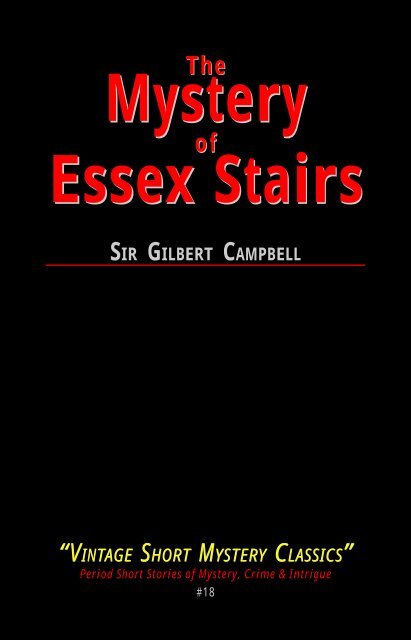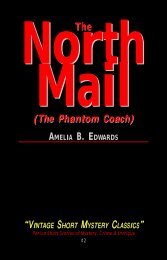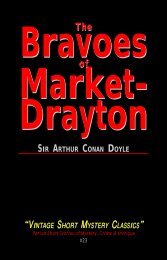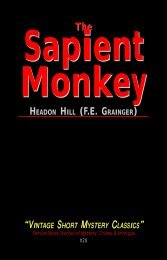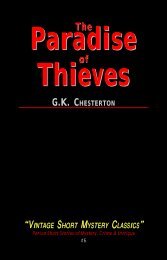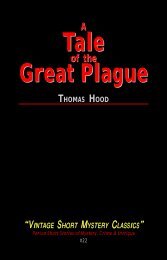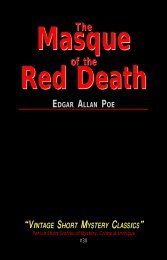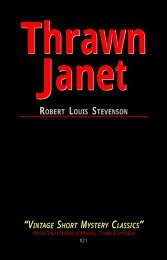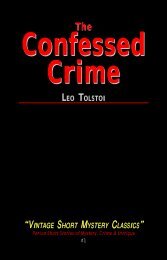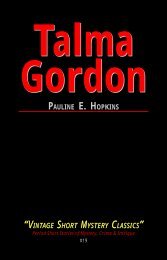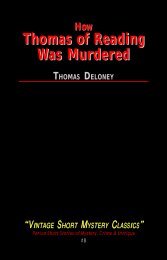Mystery Essex Stairs Mystery Essex Stairs - Hornpipe Vintage ...
Mystery Essex Stairs Mystery Essex Stairs - Hornpipe Vintage ...
Mystery Essex Stairs Mystery Essex Stairs - Hornpipe Vintage ...
You also want an ePaper? Increase the reach of your titles
YUMPU automatically turns print PDFs into web optimized ePapers that Google loves.
The<strong>Mystery</strong>of<strong>Essex</strong> <strong>Stairs</strong>SIR GILBERT CAMPBELL“VINTAGE SHORT MYSTERY CLASSICS”Period Short Stories of <strong>Mystery</strong>, Crime & Intrigue#18
All short stories in the “<strong>Vintage</strong> Short <strong>Mystery</strong> Classics” series areperiod works now in the public domain. These e-book presentationsare published by:<strong>Hornpipe</strong> <strong>Vintage</strong> PublicationsP.O. Box 18428Spartanburg, SC 29318www.hornpipe.com/mysclas.htm“<strong>Vintage</strong> Short <strong>Mystery</strong> Classics” have been selected by Daniel EltonHarmon, author of “The Harper Chronicles,” with the intent of introducingnew readers to notable works of short historical fiction inthe mystery/gothic/crime vein. For more information, please visit theauthor’s Web site at www.danieleltonharmon.com.The “message scrawled in blood”—a perhaps too familiar device incrime fiction—is the pivotal clue in this 1891 yarn by Sir GilbertCampbell (1833-99), an English translator and writer. Campbellpenned several collections of stories dealing with mystery and thesupernatural. Here, his sleuth is neither a professional nor amateurdetective, per se, but a young barrister who perceives more in the casethan either the police or the magistrate. Interestingly, muchof the story is told in the format of courtroom testimony, giving thereader an excellent seat during the sensational proceedings.—DEH
The <strong>Mystery</strong> of <strong>Essex</strong> <strong>Stairs</strong>It was a bright moonlight night, the stars were shiningclearly, and scarcely a breath of wind was stirring, asPolice Constable X924 walked slowly down <strong>Essex</strong>Street, whistling to himself softly as he did so. His tour ofduty was nearly over, and he was feeding his mind on theanticipations of a snug supper, with a comfortable pipeafterwards, when he heard a deep groan and a heavy fall,succeeded almost immediately by the rapid patter of footsteps,as though someone had made away at the top of hisspeed. These sounds appeared to come from the foot ofthe flight of stone steps, with which <strong>Essex</strong> Street terminatesat one end. “There’s something wrong there,” mutteredthe constable, as he abruptly ceased his whistlingand quickened his pace, descending the timeworn stairswith as much celerity as was compatible with safety.When, however, he reached the bottom, he couldnot at first see anything to account for the sounds whichhad alarmed him, until glancing into the dark street onthe right of the steps, he saw a shapeless mass extended onthe pavement, whilst a smaller object close by was strugglingwith quick, uncertain movements. Just as the constableflashed his bull’s-eye on the recumbent figure, andhad discovered that the struggling creature was a blackpoodle, the creature, by a sudden exertion, succeeded inemancipating itself, and, with a bark of triumph, tore awayround the corner and along the embankment in the directionof the Temple Station.
4 The <strong>Mystery</strong> of <strong>Essex</strong> <strong>Stairs</strong>I will come where you like, but I have an appointment atthat hour, and am only resting here because I have nomoney to pay for a bed.”“Gammon,” replied the constable; “a fine chance Ishould have of meeting you again if I let you out of mysight. Come along,” and he seized him roughly by thecollar.The young man made a violent resistance, but hewas weak and unable to cope with the stalwart constable,and though Scrub utterly ruined Constable X924’s pantaloonsby a sudden attack on his rear, both he and hislate master were eventually overpowered and marched offto the police station.When the prisoner, who gave the name of JohnMaynard, was brought before the magistrate, the caseseemed very black against him, and he was remanded fora week.When he was brought up again, the coroner’s inquesthad delivered a verdict of wilful murder against him,and a well-known barrister had been instructed by theTreasury to prosecute.The prisoner, John Maynard, who was in a terriblydepressed state of mind, would have been without legalassistance had not a young barrister, who had become interestedin the case, volunteered his services. ArthurMedlecott had been called to the bar about three years;he was a quiet, studious young man, and though he hadnot as yet received many briefs, had won golden opinionsin those cases in which he had been engaged.Something seemed to tell him that there was somemystery in this affair, and the further he went into it thedeeper interest he felt. The unhappy man who had been
The <strong>Mystery</strong> of <strong>Essex</strong> <strong>Stairs</strong> 5found at the foot of <strong>Essex</strong> <strong>Stairs</strong>, and who had died whilstbeing conveyed to the hospital, was identified as a certainReuben Blatchley, a betting man, who bore rather anequivocal reputation. There was no money save a few coppersfound on the body, though it was well known thedeceased had been in possession of a comparatively largesum of money before his death.Before obtaining the assistance of the young barrister,the prisoner had made a statement to the followingeffect. His name was John Maynard, aged twenty-eight,and he earned his living by exhibiting his trained dog,Scrub, at various music halls of inferior stamp. For thepast two years his mother had been suffering from a painfuland incurable disease, the expense of which took awayevery farthing he made. He had made an acquaintancewith the dead man, Reuben Blatchley, who had for somemonths been desirous of purchasing the poodle Scrub. Atlength, crushed down by adverse circumstances, Maynardhad consented to sell the faithful animal for ten pounds,which sum Blatchley had paid him at a public house onthe night of the murder. He confessed that he had beenvery angry at the time, and had accused the deceased ofputting pressure upon him, but he had no hand in hisdeath. He had parted with him outside the door of thepublic house, and after placing Scrub’s lead in his hand,had seen him turn toward the Temple, with the dog whiningand struggling to get free. Police Constable JamesMorgan, X924, deposed to finding the dying man, andalso to seeing the dog escape. He arrested the prisoner,who made considerable resistance.Cross-examined by Mr. Medlecott. “Did he not saythat he would come at ten o’clock and explain matters?”
The <strong>Mystery</strong> of <strong>Essex</strong> <strong>Stairs</strong> 7“Yes, I will swear to that.”William Hallock was next sworn. He said that hewas at the “Bunch of Grapes” on the night in question,and heard the prisoner call deceased a mean-spirited devil,who would take advantage of a man’s necessities, and thathe would repent of it sooner than he fancied. Prisoner’smanner was threatening, but deceased was conciliatory,and called him “Jack, old fellow”, offering to stand him adrink. He saw deceased receive money from the landlord.He left the house before deceased or prisoner. He had noacquaintance with either of them.By Mr. Medlecott. “What is your business?”Witness. “I haven’t any. I do odd jobs.”“Have you ever been in trouble?”“I got into a mess a year ago about a gentleman’swatch, but it was all a mistake.”“However, mistake or not, you got six months’ hardlabour.”“Yes; the witnesses were all prejudiced; it was a cruel shame.”“You were drinking in the ‘Bunch of Grapes’; wheredid you get your money from?”The witness, insolently. “I don’t see that I have anycall to tell you that, gov’nor.”“When the clerk gave you the testament you put outyour wrong hand; are you left-handed?”“There is no harm if I am, is there?”“I ask you again if you are left-handed?”Witness. “Well, for the matter of that, I am.”Police constable Robert Dicker, Z834, who had beensummoned to the spot, deposed that he had discoveredthe handwriting on the flagstone, and that the facsimileof it produced in court was perfectly correct.
8 The <strong>Mystery</strong> of <strong>Essex</strong> <strong>Stairs</strong>By Mr. Medlecott. “You assisted in placing thedeceased on the ambulance for conveyance to the hospital?”Answer. “I did.”“Did you notice his hands?”Witness. “I do not understand what you mean.”Mr. Medlecott. “Were there any bloodstains uponthem?”Witness. “No, they were perfectly clean.”Mr. Medlecott. “If there was no stain on his fingershow do you account for his having written the letters ‘J.A.’in his blood?”Witness, hesitatingly. “I cannot account for it at all.”Dr. Andrew Macalister, MD, was then called, anddeposed that he was house-surgeon at St. Gengulphus’Hospital, and that the deceased when brought in was quitedead. The witness then proceeded to state that death hadbeen caused by an incised wound in the throat, and thatit could not have been self-inflicted.By Mr. Medlecott. “Would it have been possible forthe deceased to have written the letters which have beenproduced in court after having received a mortal wound?”Dr. Macalister. “Quite possible, though I do notthink, after such a shock to the system as deceased received,he would have had sufficient presence of mind tohave given such a clue to his murderer.”No further evidence was brought forward on behalfof the prosecution, and the magistrate was aboutto commit the prisoner for trial at the approaching sessions,when Mr. Medlecott interposed, saying that hehad further evidence which he wished to bring forwardfor the defence.
The <strong>Mystery</strong> of <strong>Essex</strong> <strong>Stairs</strong> 9Peter Romney, of Beech Place, Peckham, deposed thathe was well acquainted with the deceased, and acted ashis “penciller” at all race meetings.The magistrate. “What do you mean by ‘penciller’?”The witness. “His clerk, your worship. I entered thebets he made, and kept his accounts generally. He hadplenty of money, but used to drink a bit, at times.”The magistrate. “Really, Mr. Medlecott, I cannot seethat this evidence has any bearing on the case.”Mr. Medlecott. “One moment, sir, and I think youwill see that I am not wasting the time of the court.”To the witness. “Had you any particular reason foracting as clerk to the murdered man?”Witness, with a laugh. “He had a precious good reasonfor engaging me, for if it had been to save his life, hecouldn’t have written a single letter of the alphabet.”Sensation in the court.Mr. Medlecott. “Thank you, that will do. Please callMr. Erasmus Urswick.”Erasmus Urswick stepped into the witness box, andmade the following statement: “I am a professional expertin handwriting, and I have examined the facsimile of themarks made in blood on the flagstone, which were suppliedto me by the police authorities. The letters ‘J.A.’,and the unfinished semicircle, have certainly been tracedby someone using their left hand; of this there can be nodoubt—”The magistrate. “I should really be unwilling, Mr.Urswick, to challenge the professional opinion of a gentlemanwho has now such a reputation as you have, but doyou not think that you are going a little too far?”Mr. Urswick. “In what way, your worship?”
10 The <strong>Mystery</strong> of <strong>Essex</strong> <strong>Stairs</strong>The magistrate. “In so decidedly stating that thewriting must have been executed with the left hand.”Mr. Urswick. “The caligraphy of the right hand differsin the most wonderful and marked manner, and thereare very few persons whose handwritings are alike; but inthe course of my experience, I have invariably found thatthe writing executed by the left hand has almost invariablythe same characteristics. I produce, for the inspectionof the court, a sheet of paper, upon which I haveobtained a dozen copies of the letters ‘J.A.’ Not copies,for they have not seen the facsimiles in the hands of thepolice. They were all effected in the same manner—bydipping the forefinger in blacking—and your worship willobserve the marked resemblance between the various attempts.I am now going to make a further statement,which may seem even more incredible than my first one,and that is, that if the letters were written with the lefthand, they were never written by the dead man.”The magistrate. “That is a bold assertion, Mr. Urswick,and I shall be glad to hear how you will prove it.”“I was brought up, your worship, for the medicalprofession, and took my degree in due course, but I, aftera time, abandoned it—I am sure Dr. Macalister will pardonme—for a less precarious position. I examined theleft hand of the murdered man, and I find that the middlefinger is wanting, doubtless the result of some accident,and the forefinger and the one next to it are stiff and unbendable,so that by no possibility could they have beenused to inscribe the letters ‘J.A.’ I appeal to Dr. Macalisterto know whether I am, or am not, right.”Dr. Macalister, rising and bowing. “You are perfectlyright, Mr. Urswick.”
The <strong>Mystery</strong> of <strong>Essex</strong> <strong>Stairs</strong> 11Renewed sensation in the court.The magistrate. “Then what is your argument, Mr.Medlecott?”Mr. Medlecott. “That it would be absurd to supposethat my client would have inscribed the two first letters ofhis Christian name had he been the actual murderer, andthat ‘J.A.’ was written by the real criminal in order tothrow the blame upon an innocent party.”“You forget the blood upon the coat, and the twofive-pound notes, which have been identified as havingbeen in possession of the deceased on the night of themurder, and which were found upon the prisoner.”“The notes, my client has asserted, were given himin payment for the poodle, which the police constable,who discovered the body, saw escaping from the dyingman’s grasp; and the blood is easily accounted for by awound which the dog received when the murderer madehis first attack, and with which he would have stained hismaster’s coat in his joy at finding him again.”“Let the dog be brought into court,” said the magistrate;“I should like to examine the wound myself.”Within five minutes after this order had been given, asudden tumult arose at the door of the court. The barkingand snarling of a dog was mingled with the oaths and vociferationsof a man, and a confused murmur from the officials.Above it all rose the tones of a man, prouncing thesewords, clearly and distinctly: “You infernal brute, are younot content with having bitten my leg nearly through forthe accidental slash I gave you at the foot of <strong>Essex</strong> Street,but you must make for me again.”“There is the end of my case for the defence, yourworship,” remarked Mr. Medlecott. “Scrub, the poodle,
12 The <strong>Mystery</strong> of <strong>Essex</strong> <strong>Stairs</strong>has put in the finishing link of evidence, and if you wantthe real murderer, why, there he stands, self-confessed, inthe person of William Hallock, the left-handed villain who,with his fingers dipped in the victim’s blood, traced thelying letters which have almost thrust an innocent man’sneck into the hangman’s noose.”Taken by surprise, and feeling that there was no retractingthe admission he had made, Hallock sulkily confessedhis crime. The remainder of the stolen notes werefound in the lining of his coat, and Scrub’s mark was visibleon the calf of his leg. He confessed that he had seenthe notes handed over to Blatchley and heard the quarrelbetween the two men. The idea of the crime had flashedsuddenly upon him, and waiting outside, he had doggedthe betting man, after he had parted with Maynard, untila convenient spot was reached, when, springing upon him,he had cut his throat with a razor which he had in hispocket. The dog had received a chance cut in the struggle,and had retaliated after the manner of his kind with histeeth. He had then robbed the dying man, and traced theletters ‘J.A.’ on the flagstone near, as if the expiring effortsof the victim had been to give a clue to his murderer. Hehad then run off at full speed and hurled the bloodstainedweapon into the Thames.In due time William Hallock expiated his crime onthe gallows, whilst John Maynard, whom Scrub had quietlyfollowed out of court, was lucky enough to obtain agood engagement for his canine protégé at one of the leadingmusic halls, where his sensational story became knownthrough the medium of the press, and so to supply hismother in her last days with every comfort.—SIR GILBERT CAMPBELL
Dabbling in <strong>Mystery</strong>. . . .Have a hankering to explain the hitherto unexplained?Curious about the lives of noted mysteryauthors? Intrigued by their fabricated puzzles—and by real-life enigmas?Join author Daniel Elton Harmon on the Internetin wide-ranging discourses on historical riddles,unique crimes, the supernatural and the starklyodd. “Mysterious Expeditions” presents notes andcommentaries on true mysteries as well as vintagemystery authors and their works. AND . . . you’reencouraged to contribute your own findings! Paya call to this exciting new historical mystery blog:http://mysteriousexpeditions.blogspot.com.South Carolina author and editor Daniel Elton Harmon has writtenmore than fifty books. Recently published by Chelsea House are his sixvolumes in the “Exploration of Africa: The Emerging Nations” series;The Titanic, part of the “Great Disasters: Reforms and Ramifications”series; his history of the Hudson River for the “Rivers in American Lifeand Times” series; and juvenile biographies in the “Explorers of NewWorlds” series. Other of his books are published by Wright/McGraw-Hill, Mason Crest and Barbour Publishing. His freelance articles haveappeared in such periodicals as Nautilus, Music Journal and The New YorkTimes. Harmon is the associate editor of Sandlapper: The Magazine ofSouth Carolina and editor of The Lawyer’s PC, a technology newsletter.The Chalk Town Train & Other Tales: “The Harper Chronicles,” VolumeOne is his first book of fiction and the first of his series of short storycollections that follow the career of Harper the crime reporter.
Harper is at the scene. . . .Six unmarked graves hold the secretto an older generation’s hideous ordeal.. . .Escaped convicts invade a riversidecampsite. . . .A ring of prestigious businessmencarry out a massive estate swindle inthe state capital. . . .Shipwreck survivors sheltered at aLow Country fishing village havemuch, much to hide. . . .And the president of the United States turns to a small-cityjournalist to intercept a potentially disastrous item of diplomaticcorrespondence. . . .Harper, nonconformist crime reporter for the fledgling Challenge,finds himself in the thick of these and other dramas in thepost-Reconstruction South. Through intuition, deduction, focusedresearch and on-the-scene investigation, Harper probes to theheart of each affair. In the process, he often uncovers facts andcircumstances he can never publish—and enters the hazy borderlandbetween observer and participant.The Chalk Town Train & Other Tales, Daniel Elton Harmon’s firstvolume of “Harper” short stories, has received rave reviews inhistory/mystery circles and is available in print. Visitwww.danieleltonharmon.com to learn more about this excitingnew series and read what the critics are saying!An author-signed copy of The Chalk Town Train & Other Tales(softbound, 157 pages) costs $15 postpaid. Please make check ormoney order payable to “Dan Harmon” and mail to the author atP.O. Box 18428, Spartanburg, SC 29318.(Note: We cannot conscientiously support credit card companies andthus do not accept credit card orders.)


